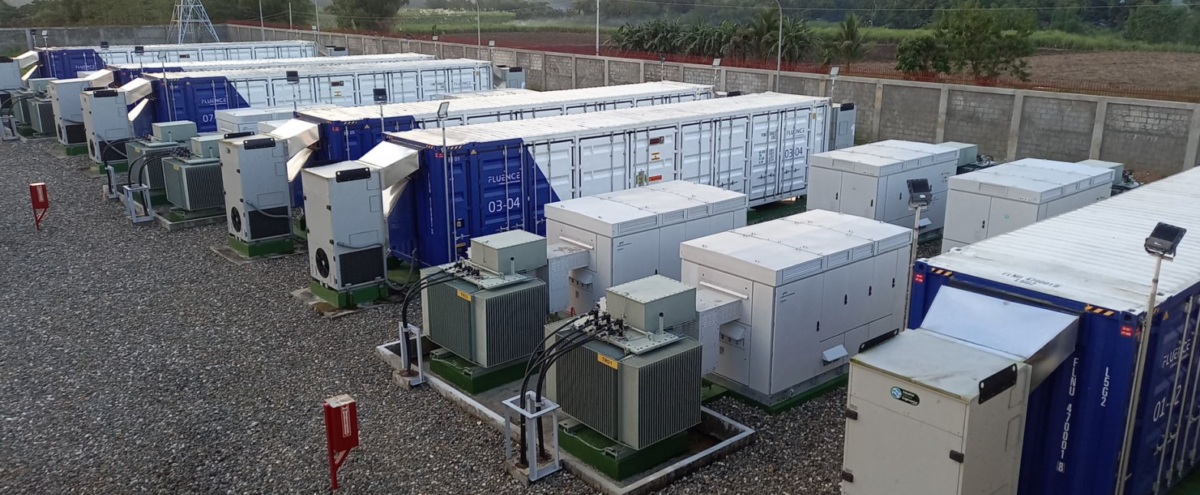The power arm of Philippines-based brewing-to-energy conglomerate San Miguel Corporation (SMC) is moving on its ambitious plan to deploy 1GW of batteries this year, with its first, 20MW/20MWh project now ready to provide ancillary services to the grid.
The Kabankalan battery is the first utility scale project controlled by a grid operator in the Philippines and the first operational energy storage asset on the Visayas regional grid, which hosts the largest amount of solar generation capacity in the country.
Kabankalan is also the first energy storage system in a 470MW/470MWh portfolio German and U.S.-owned energy storage joint venture Fluence has been contracted to supply and maintain for the SMC Global Power unit of the Filipino conglomerate.
pv magazine print edition
SMC Global Power this month said it was ready to start operation of an initial 690MW of battery storage facilities as part of a plan to complete 31 energy storage systems this year, with an accumulated capacity of 1GW.
The company's battery portfolio started to take shape last year when SMC revealed it was nearing completion on projects nationwide. It announced 31 batteries would be deployed this year, not only to improve power reliability and help frequency control, but also to pave the way for the integration of 3GW of intermittent renewables capacity.
At the time, SMC president Ramon See Ang said his company would build solar plants in combination with battery storage at 10 locations. These are scheduled to go online by next year.
Kabankalan is the first battery in SMC's portfolio to enter commercial operation. The project was unveiled last year when Fluence said it had commissioned two 20MW/20MWh batteries for SMC Global Power. With project sites ranging in size from 20-60MW, the SMC portfolio procured with Fluence is spread across 13 sites.
Located in Negros Occidental, Kabankalan is only the second grid scale battery in the Philippines, following a 10MW/10MWh system at the Masinloc Power Plant in Zambales, also supplied by Fluence, in 2016.
The new system is the first such asset in the country to be directly controlled by the National Grid Corporation of the Philippines, using automatic generation control to provide grid stabilization services including managing frequency and voltage, and supplying reactive power. Such services are critical for ensuring the stability of regional electricity grids across the Philippines which are often plagued by power outages.
Challenges
Fluence said the Kabankalan project was delivered on time despite challenges stemming from the Covid-19 pandemic, including supply chain delays, worker travel restrictions and coordinating construction amid complex on-site rules.
“Each new battery asset we and SMCGPH [SMC Global Power Holdings] bring online strengthens the Philippine grid, adding flexibility in the right places and with the right capabilities to support the nation’s energy transition,” said Fluence president for Asia-Pacific, Jan Teichmann. Fluence will continue deploying storage systems for SMC’s portfolio of projects across the Philippines through July, with additional facilities planned for commissioning and testing in “early 2022.”
SMC’s battery-based energy storage portfolio is reportedly the largest such procurement to date in Southeast Asia.
This content is protected by copyright and may not be reused. If you want to cooperate with us and would like to reuse some of our content, please contact: editors@pv-magazine.com.




6 comments
By submitting this form you agree to pv magazine using your data for the purposes of publishing your comment.
Your personal data will only be disclosed or otherwise transmitted to third parties for the purposes of spam filtering or if this is necessary for technical maintenance of the website. Any other transfer to third parties will not take place unless this is justified on the basis of applicable data protection regulations or if pv magazine is legally obliged to do so.
You may revoke this consent at any time with effect for the future, in which case your personal data will be deleted immediately. Otherwise, your data will be deleted if pv magazine has processed your request or the purpose of data storage is fulfilled.
Further information on data privacy can be found in our Data Protection Policy.